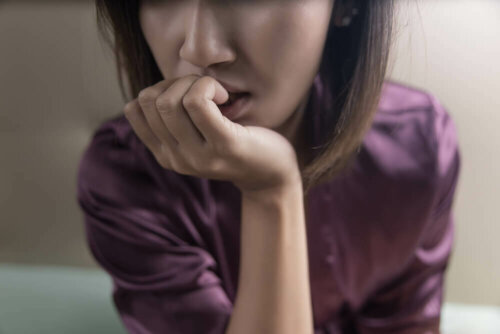The Relationship Between Tachycardia and Anxiety


Written and verified by the doctor Leonardo Biolatto
Tachycardia due to anxiety is quite common in doctor’s offices. This is because modern lifestyles promote stress. The kind that leads to all sorts of physical and psychological problems.
In principle, tachycardia due to anxiety isn’t a serious health problem and doesn’t usually lead to major consequences. However, anxiety can become chronic and become a risk factor in other more serious conditions.
This kind of tachycardia usually lasts for only a few minutes and then goes away. Despite this, some people might think it’s a heart attack or some other dangerous condition. Thus, it’s important to learn to recognize and handle it when it happens to you.
Anxiety and heart health
People with anxiety are more likely to develop long-term heart conditions. For one, anxiety is normal when it occurs in response to a stimulus that involves risk or danger. Almost everyone has experienced one of these episodes throughout our lives.
However, it’s a different story to continuously be anxious, especially when there’s no reasonable cause for it. You have a chronic anxiety disorder if you experience symptoms for more than six months. Estimates indicate that between 5 and 11% of the population suffers from this problem.
Chronic anxiety puts stress on the heart and can weaken the cardiovascular system in the long run. In severe cases, it could lead to a heart attack or a stroke. This is so because the hormones and substances released in states of stress increase blood pressure or increase vasoconstriction.

Keep reading Digestive Problems Caused By Anxiety
Tachycardia
This is defined as an increased heart rate, when the heart beats at a faster rate than normal. There are between 60 and 100 beats per minute in a healthy person who’s at rest. However, the heart of someone with tachycardia exceeds 100 beats per minute.
There are several types of tachycardias. Furthermore, they’re classified into two large groups depending on the area of the heart where they originate:
- An atrial tachycardia originates in the upper chambers of the heart, called atria
- A ventricular tachycardia begins in the lower chambers of the heart, called the ventricles
Anxiety tachycardia is common, but it isn’t the only cause of the increased heart rate. It can be due to heart disease, hypertension, diabetes, sleep apnea, thyroid problems, anemia, or the use of some substances. Thus, you must always consult your doctor if you experience any symptoms.
Tachycardia and anxiety
The heart is unable to effectively pump oxygenated blood to the rest of the body when the heart rate is very high. Other symptoms may occur under these circumstances, such as palpitations, shortness of breath, vertigo and dizziness, tiredness, weakness, chest pain, and fainting.
Anxiety, on the other hand, has a state of nervousness, restlessness, or agitation as the main symptom. There’s a sense of imminent danger or a feeling that something very bad is about to happen. For instance, the breathing accelerates, there’s trembling, sweating, tiredness, and even weakness.
Other less obvious symptoms are gastrointestinal problems and difficulty falling asleep. A person with chronic anxiety feels worried and cannot push threatening thoughts out of their mind. Anxiety leads to physiological changes and is a risk factor for various pathologies.

Find out more How Anxiety Affects Your Body Odor
Dealing with tachycardia and anxiety
Tachycardia due to anxiety is common and doesn’t go away until the emotions are under control. Thus, first of all, you must understand that this increase in heart rate is the result of anxiety.
At times like these, it’s often best to find a resting position and then breathe slowly and deeply for a few minutes. Also, try to evoke some pleasant images, such as a calm landscape, a pleasant event, or a motivating person.
Your heart will return to its normal rhythm after a short amount of time. Professionals advise introducing magnesium in your diet and reducing your consumption of caffeine, alcohol, and tobacco. In addition, exercising regularly is one of the best antidotes to anxiety, as well as a powerful cardiovascular protector.
Thanks for reading.
All cited sources were thoroughly reviewed by our team to ensure their quality, reliability, currency, and validity. The bibliography of this article was considered reliable and of academic or scientific accuracy.
- Olivi, R. H. (2013). Apnea del sueño: cuadro clínico y estudio diagnóstico. Revista médica clínica las Condes, 24(3), 359-373.
- Pablos-Herrero, E., Fabra-Noguera, A. M., & Montserrat-Izquierdo, M. E. (2013). Palpitaciones en situación de estrés. SEMERGEN-Medicina de Familia, 39(1), 56-58.
- de Matteis, M., & Villamor, I. B. (2015). Protocolo diagnóstico y terapéutico de la ansiedad aguda. Medicine-Programa de Formación Médica Continuada Acreditado, 11(84), 5036-5040.
This text is provided for informational purposes only and does not replace consultation with a professional. If in doubt, consult your specialist.








